Abstract
The role of serotonin as an immune modulator was investigated by measuring the functional competence of T cells from control mice versus from mice whose intracellular stores of serotonin had been depleted by pretreatment with p-chlorophenylalanine (PCPA). While the proportions of splenic CD4+ and CD8+ T cells isolated from control and PCPA-treated mice were similar, the level of expression of the alpha-chain interleukin-2 receptor (IL-2R) was reduced on splenic CD4+ cells but not on CD8+ cells. Culture with the T-cell mitogen concanavalin A (Con A) failed to induce expression of the IL-2R on either CD4+ or CD8+ cells of PCPA-treated mice, although IL-2R was induced on control cells. The proliferative response to Con A by these spleen cells from PCPA-treated mice was also reduced compared to that by control spleen cells. Both expression of IL-2R and proliferation in response to Con A by spleen cells from serotonin-depleted mice were increased or completely restored by supplementation of the cultures with serotonin. Studies to identify the mechanisms for the reduction in T-cell activation when serotonin levels were reduced implicated a defect in the capacity of macrophages from PCPA-treated mice to provide accessory help for T-cell activation. Splenic macrophages from control mice were able to restore the blastogenic capability of lymphocytes from PCPA-treated mice, although macrophages from PCPA-treated mice were unable to support normal lymphocyte blastogenesis unless the cultures were supplemented with serotonin. These results show the requirement of autologous serotonin for optimal T-cell activation and suggest the importance of serotonin in macrophage accessory function for T-cell activation.
Full text
PDF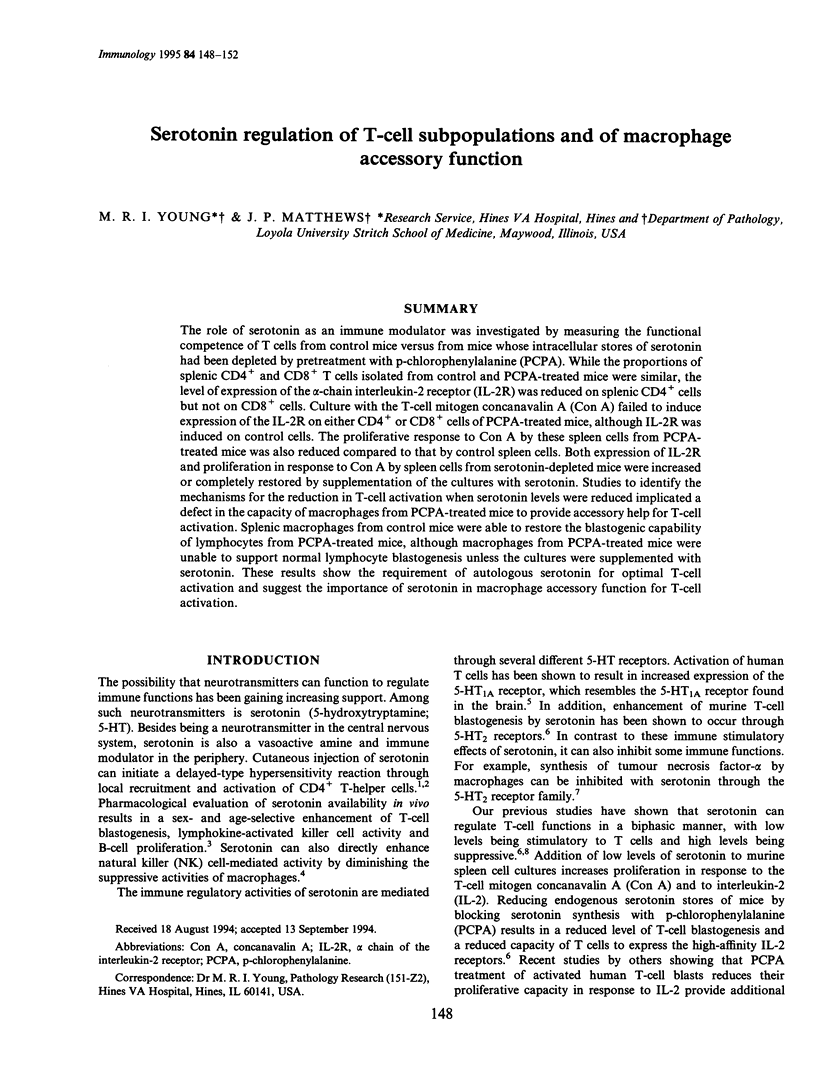
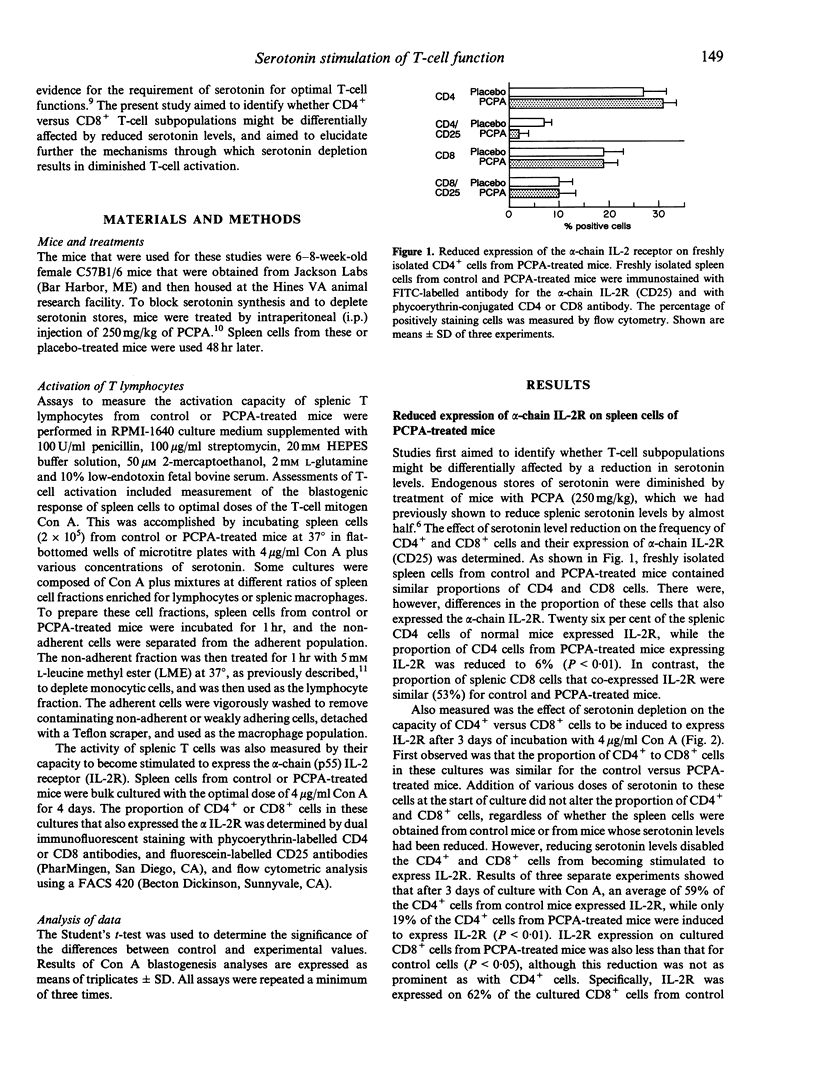
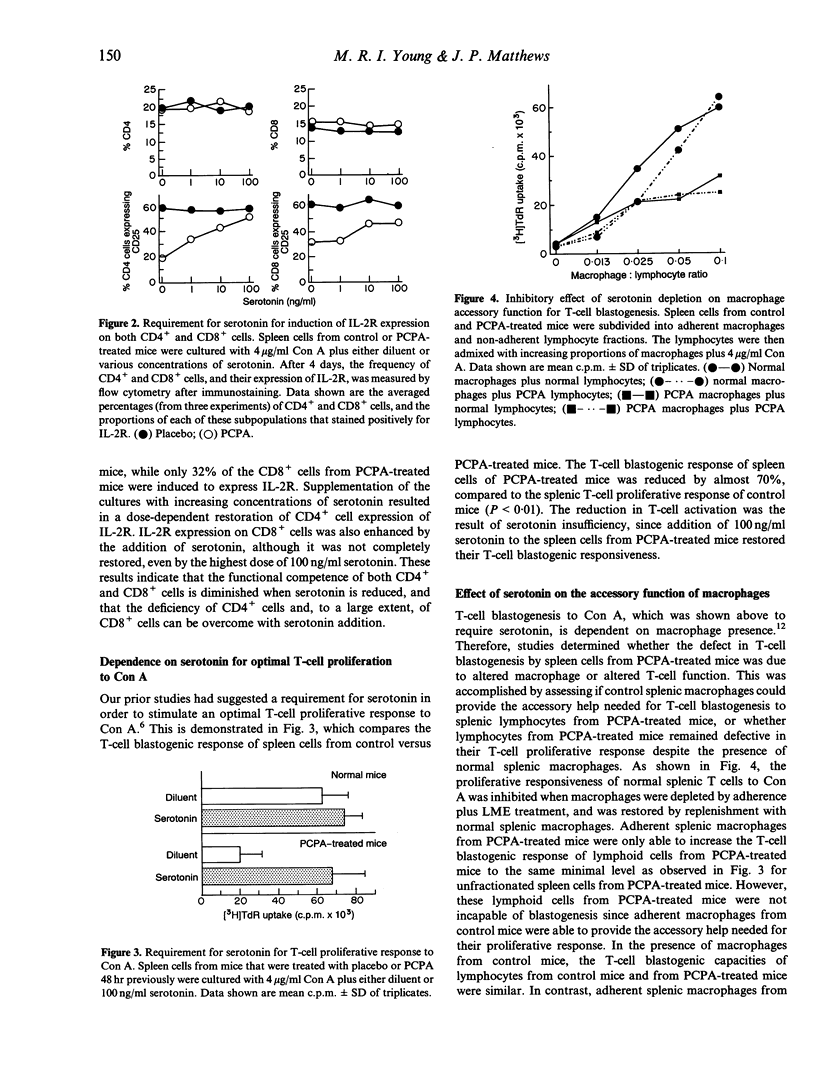
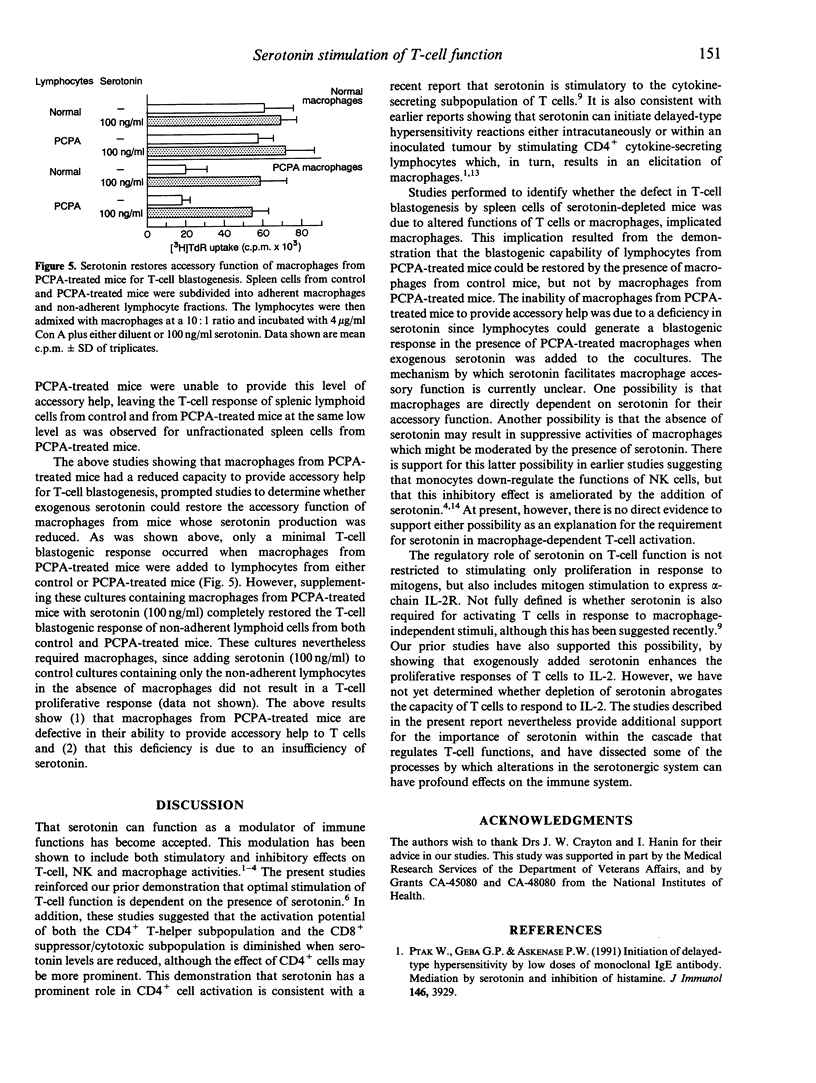
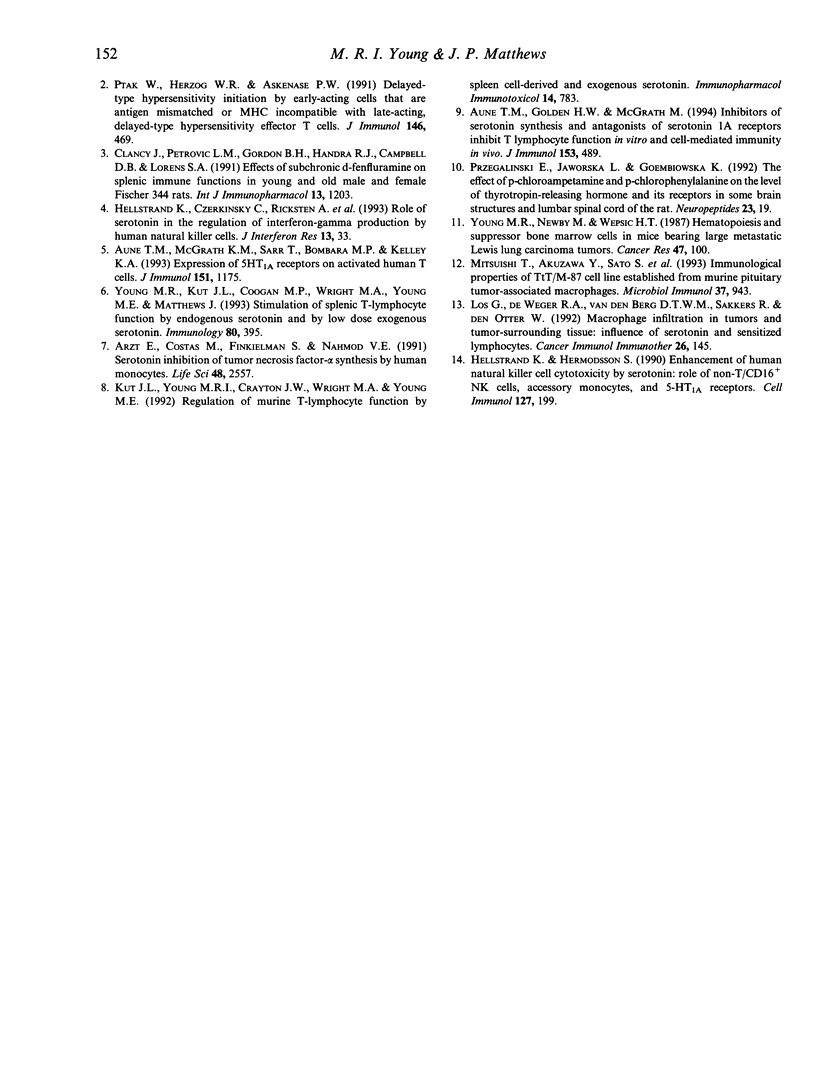
Selected References
These references are in PubMed. This may not be the complete list of references from this article.
- Arzt E., Costas M., Finkielman S., Nahmod V. E. Serotonin inhibition of tumor necrosis factor-alpha synthesis by human monocytes. Life Sci. 1991;48(26):2557–2562. doi: 10.1016/0024-3205(91)90612-f. [DOI] [PubMed] [Google Scholar]
- Aune T. M., Golden H. W., McGrath K. M. Inhibitors of serotonin synthesis and antagonists of serotonin 1A receptors inhibit T lymphocyte function in vitro and cell-mediated immunity in vivo. J Immunol. 1994 Jul 15;153(2):489–498. [PubMed] [Google Scholar]
- Aune T. M., McGrath K. M., Sarr T., Bombara M. P., Kelley K. A. Expression of 5HT1a receptors on activated human T cells. Regulation of cyclic AMP levels and T cell proliferation by 5-hydroxytryptamine. J Immunol. 1993 Aug 1;151(3):1175–1183. [PubMed] [Google Scholar]
- Clancy J., Jr, Petrovic L. M., Gordon B. H., Handa R. J., Campbell D. B., Lorens S. A. Effects of subchronic d-fenfluramine on splenic immune functions in young and old male and female Fischer 344 rats. Int J Immunopharmacol. 1991;13(8):1203–1212. doi: 10.1016/0192-0561(91)90171-3. [DOI] [PubMed] [Google Scholar]
- Hellstrand K., Czerkinsky C., Ricksten A., Jansson B., Asea A., Kylefjord H., Hermodsson S. Role of serotonin in the regulation of interferon-gamma production by human natural killer cells. J Interferon Res. 1993 Feb;13(1):33–38. doi: 10.1089/jir.1993.13.33. [DOI] [PubMed] [Google Scholar]
- Hellstrand K., Hermodsson S. Enhancement of human natural killer cell cytotoxicity by serotonin: role of non-T/CD16+ NK cells, accessory monocytes, and 5-HT1A receptors. Cell Immunol. 1990 Apr 15;127(1):199–214. doi: 10.1016/0008-8749(90)90125-b. [DOI] [PubMed] [Google Scholar]
- Kut J. L., Young M. R., Crayton J. W., Wright M. A., Young M. E. Regulation of murine T-lymphocyte function by spleen cell-derived and exogenous serotonin. Immunopharmacol Immunotoxicol. 1992;14(4):783–796. doi: 10.3109/08923979209009235. [DOI] [PubMed] [Google Scholar]
- Los G., De Weger R. A., Van den Berg D. T., Sakkers R., Den Otter W. Macrophage infiltration in tumors and tumor-surrounding tissue: influence of serotonin and sensitized lymphocytes. Cancer Immunol Immunother. 1988;26(2):145–152. doi: 10.1007/BF00205608. [DOI] [PMC free article] [PubMed] [Google Scholar]
- Mitsuishi T., Akuzawa Y., Sato S., Rui J., Kodama K., Inoue K., Kurashige S. Immunological properties of TtT/M-87 cell line established from murine pituitary tumor-associated macrophages. Microbiol Immunol. 1993;37(12):943–951. doi: 10.1111/j.1348-0421.1993.tb01728.x. [DOI] [PubMed] [Google Scholar]
- Przegaliński E., Jaworska L., Gołembiowska K. The effect of p-chloroamphetamine and p-chlorophenylalanine on the level of thyrotropin-releasing hormone and its receptors in some brain structures and lumbar spinal cord of the rat. Neuropeptides. 1992 Sep;23(1):19–25. doi: 10.1016/0143-4179(92)90005-h. [DOI] [PubMed] [Google Scholar]
- Ptak W., Geba G. P., Askenase P. W. Initiation of delayed-type hypersensitivity by low doses of monoclonal IgE antibody. Mediation by serotonin and inhibition by histamine. J Immunol. 1991 Jun 1;146(11):3929–3936. [PubMed] [Google Scholar]
- Ptak W., Herzog W. R., Askenase P. W. Delayed-type hypersensitivity initiation by early-acting cells that are antigen mismatched or MHC incompatible with late-acting, delayed-type hypersensitivity effector T cells. J Immunol. 1991 Jan 15;146(2):469–475. [PubMed] [Google Scholar]
- Young M. R., Kut J. L., Coogan M. P., Wright M. A., Young M. E., Matthews J. Stimulation of splenic T-lymphocyte function by endogenous serotonin and by low-dose exogenous serotonin. Immunology. 1993 Nov;80(3):395–400. [PMC free article] [PubMed] [Google Scholar]
- Young M. R., Newby M., Wepsic H. T. Hematopoiesis and suppressor bone marrow cells in mice bearing large metastatic Lewis lung carcinoma tumors. Cancer Res. 1987 Jan 1;47(1):100–105. [PubMed] [Google Scholar]


